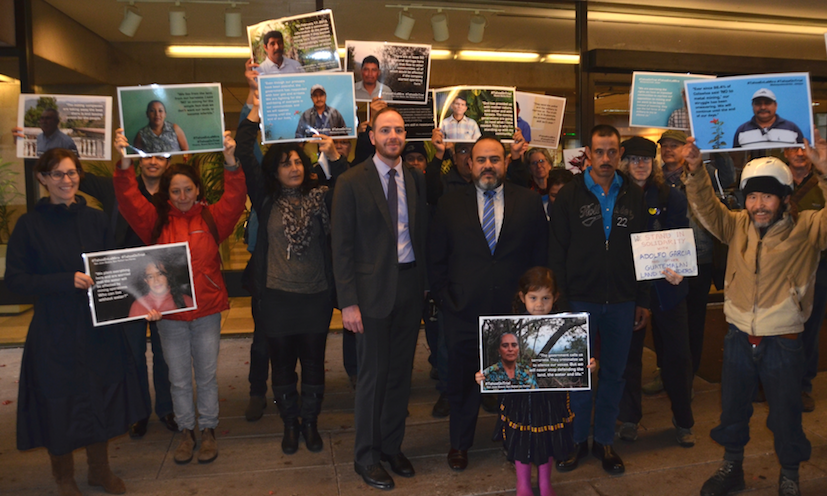On April 27, 2013, Adolfo García was one of seven men shot and wounded as he tried to escape the advance of Tahoe Resources’ private security guards just outside the gates of the company’s Escobal silver mine where they had been peacefully protesting. This week, Mr. García was in Vancouver, along with Guatemalan lawyer Rafael Maldonado from the Centre for Legal, Environmental and Social Action (CALAS), to observe a hearing at the BC Court of Appeal over whether or not he and six others will be able to pursue justice against Tahoe Resources in Canada. In solidarity with Mr. Garcia and Mr. Maldonado, the Vancouver Mining Justice Alliance organized a demonstration outside the BC Court of Appeals, recognizing the difficult battle the Guatemalans face to achieve justice in Canada.
The violence in April 2013 was part of a campaign of repression geared to quash growing resistance to the mine, which Tahoe feared could impede it from entering operation. By this time, over a dozen communities and municipalities in the area had held local votes in which tens of thousands of people demonstrated their disapproval of mining in this largely agricultural area. Daily protests against the project began in April 2013, after the Ministry of Energy and Mines approved the company’s final mining permit, dismissing without consideration over two hundred individual appeals that expressed concerns about the potential health and environmental impacts of the mine. Tahoe’s former chief of security, Alberto Rotondo, is accused of having ordered the attack and for obstruction of justice in Guatemala. Tahoe Resources is accused of negligence and battery in Canada. Escobal was the company’s only project at the time of this violence.
The current question before the BC Court of Appeals is whether or not the case against Tahoe Resources would be better heard in Canada or Guatemala.
Mr. García’s Canadian legal team includes the Canadian Centre for International Justice (CCIJ) and Camp Fiorante Matthews Mogerman (CFM) in Vancouver. During a webinar following the hearing, CCIJ Legal Director Matt Eisenbrandt explained the inherent power imbalance at play in the case, given the economic interests of both the company and the Guatemalan government in the mine’s operations. In favour of the case being heard in Canada, he indicated that their team has presented ample evidence about the lack of independence in the Guatemalan judicial system, including the prevalence of corruption and influence peddling, which was precisely the reason the International Commission Against Impunity in Guatemala (CICIG its initials in Spanish) was created nearly ten years ago.
Despite the evidence, in November 2015, Justice Laura Gerow of the B.C. Supreme Court refused to accept jurisdiction over the case, ruling that Guatemala would be a better forum for the suit to be heard.
Mere weeks later, new evidence emerged as to why the case would be better heard in Canada: Tahoe’s former chief of security escaped house arrest and fled Guatemala. He was later rearrested by INTERPOL in his native Peru and a process of extradition initiated to return him to Guatemala to face trial. But it is not known when or if his trial will be able to continue. These facts were presented as new evidence in the Guatemalans’ appeal.
Eisenbrandt notes that Rotondo’s escape illustrates the systemic problems in Guatemala’s judicial system and the extraordinary difficulty that the plaintiffs face in achieving justice or compensation in Guatemala. Additionally, the suit against Rotondo does not involve Tahoe Resources, from whom the plaintiffs are also seeking justice for its role in the violence.
A decision from the three-judge panel over whether or not the case should be heard in BC could take three to six months. Whatever their decision, it is possible that it too could be appealed.
Visit tahoeontrial.net for more information and updates.
Photo: murray bush - flux photo
